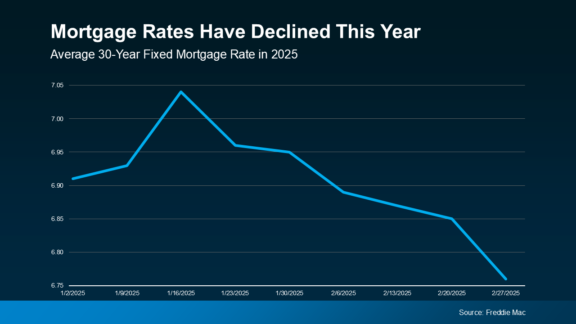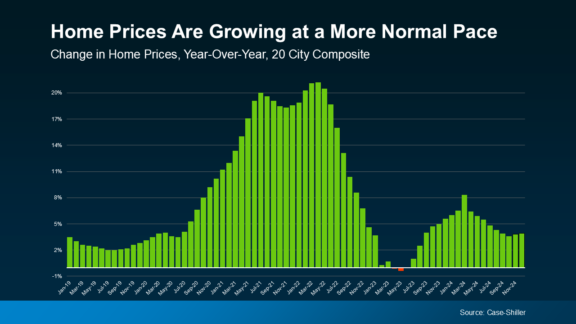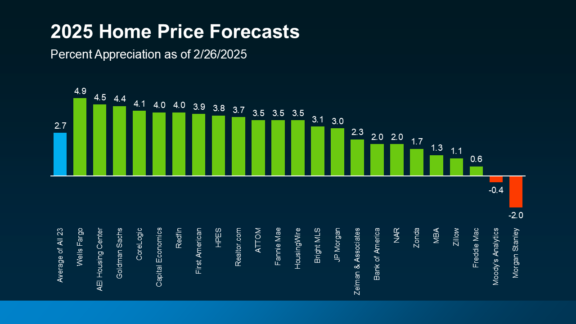
Welcome to the Housing Market Trends April 2025 monthly update from Homes for Heroes. This report focuses on the residential real estate housing market. We listen to the experts and boil down what they have to say to assist you, our heroes, with decision making regarding buying a home, selling your home, or refinancing your mortgage.
Housing Market Trends April Key Takeaways
The housing market is ever-evolving. Economic factors, government policies, interest rates, and even socio-cultural shifts can play a role in how the market behaves. That said, here are some housing market trends for April to help determine what’s best for you as you consider your housing situation:
- Mortgage Rate Trends – Mortgage interest rates remain steady but slightly lower than projected for Q1, offering a potential opportunity for buyers who can afford current rates, with future refinancing as a viable option.
- Home Inventory Trends – Existing home inventory is up 17% year-over-year, giving buyers more choices, though affordability remains a challenge due to elevated interest rates and rising home prices.
- Home Pricing Trends – Home prices continue a healthy, moderate climb with a 3.8% year-over-year increase, signaling stable equity gains for sellers and homeowners.
- Homebuyer Outlook – While higher rates and prices still limit affordability, increased inventory and slower price growth could give prepared buyers an edge in the current market.
- Save with Homes for Heroes – The Homes for Heroes program provides significant savings to community heroes, with an average savings of $3,000 after buying, selling, or refinancing a home with their local specialists. Sign up today to begin and a Homes for Heroes local specialist will contact you to answer your questions.
Housing Market Trends April 2025 in Detail
Mortgage Rate Trends
If you have been watching mortgage interest rates over the past 6 months, you’ve witnessed the roller coaster of ups and downs first hand.
On March 19, 2025 the Federal Reserve announced that it would be holding interest rates steady for now. This means there will be no mortgage interest rate relief driven by the Fed in the near future. The Fed made this decision based on high uncertainty among consumers and businesses around the impact of recently proposed tariffs, and the impact they may have on the U.S. economy.

However, since the beginning of 2025, the average 30-year fixed mortgage rate has declined as depicted in the line graph above.
In March, the average 30-year fixed mortgage interest rate hovered around 6.6%, according to OptimalBlue estimates. As of Monday March 24, OptimalBlue shows the 30-year conforming at 6.624% and the 15-year conforming at 5.818%. For yesterday’s mortgage interest rate indices, be sure to check out our mortgage rate calculator.
Right now, the market is beating the average interest rates projections in quarter one, 2025. Experts projected an average interest rate for the 30-year fixed mortgage of 6.9%. This is welcomed news. Although other factors will make interest rates fluctuate as the year goes on, it’s good to see the market beating the projected interest rate levels in Q1.
The advantage for a potential home buyer who can afford to enter the market with interest rates at current levels, means they will face less competition and potentially gain some buyer power if the seller is receiving less interest in their home, or a lack of offers.
If interest rates do come down, which they likely will in the future, a person who purchases a home today can refinance their mortgage. This is always an option if the opportunity of a lower interest rate presents itself, and it makes sense from a financial standpoint, because there are costs associated with refinancing.
If you are thinking about getting into the housing market, remember to consider working with Homes for Heroes real estate and mortgage specialists to help you through the process. We help local heroes (firefighters, EMS, law enforcement, military and veterans, healthcare professionals, and teachers) save significant money when they close on a home with our specialists. On average, one of our heroes can save $3,000 if they buy a home, and $6,000 if they buy AND sell a home.
Sign up today to speak with the Homes for Heroes local specialist in your area. They will reach out to answer your questions, and find out how they can best serve you.
Home Inventory Trends
The National Association of Realtors (NAR) reported the inventory of unsold existing homes increased 5.1% in February 2025 versus the previous month of January 2025. This is a 17% increase versus one year ago in February 2024.
Increased inventory is great news for buyers looking for the right home. It gives buyers more opportunity to find a home that fits their needs at a price they can afford.
Even though this increase in existing home inventory is much needed and important to the industry, the challenges for many first time home buyers is interest rates are still hovering in the mid-6 percent range and home prices are still rising, making home affordability the primary issue.
2025 Home Pricing Trends

The National Association of Realtors (NAR) reported that national home prices increased 3.8% in February 2025, versus YOY February 2024. And, that marks the 20th consecutive month of year-over-year national median existing home sales price gains.
These incremental increases are “healthy” levels of home price appreciation versus in 2021 and 2022 when we were experiencing double-digit home price appreciation rates.
The bar graph above shows home price increases have slowed and reached more of a “normal” level, as we near levels closer to the 2019 pre-pandemic levels of incremental growth.
A healthy appreciation level is great news for homeowners worried about loss of recent equity gains for their current home. It’s also good news for would-be home sellers who want to capitalize on the recent home price increases to leverage that gained equity for other financial priorities.

The bar graph above shows the home price forecasts for a list of industry leaders and provides an average increase for 2025 of 2.7 percent.
However, even though home prices are not increasing as much as they did a few years ago, even the smaller incremental growth remains problematic for would-be home buyers already struggling to find a home that meets their needs at a price they can afford.
Receive an Average of $3,000 from Homes for Heroes
Homes for Heroes assists firefighters, EMS, law enforcement, active military and veterans, healthcare professionals and teachers; with buying, selling and refinancing their home or mortgage. But if you work with our local real estate and mortgage specialists to buy, sell or refinance; they also provide significant savings after you close on a home or mortgage.
We refer to these savings as Hero Rewards, and the average amount received by a hero who closes on a home with our local specialists is $3,000, or $6,000 if you buy and sell!
Simply sign up to speak with a local Homes for Heroes specialist in your area. There’s no obligation. After you sign up, a member of our team will contact you to ask a few questions and help you determine the appropriate next steps for you.
Our local real estate and/or mortgage specialists in your area are ready and willing to assist you through every step of the process, and save you money when it’s all done.
It is how Homes for Heroes and our local specialists thank community heroes like you for your dedication and valuable service.
Estimate Your Savings
Learn how much you could save on your home purchase. Adjust the slider to see potential savings when you buy with a Homes for Heroes real estate and mortgage specialist. This is an estimate. Your actual savings may vary.